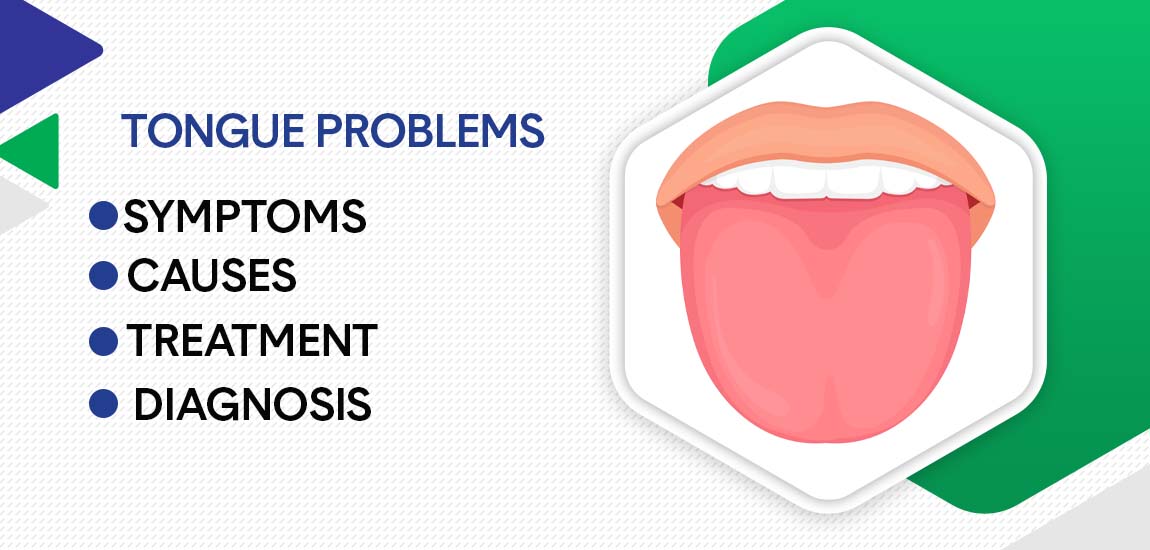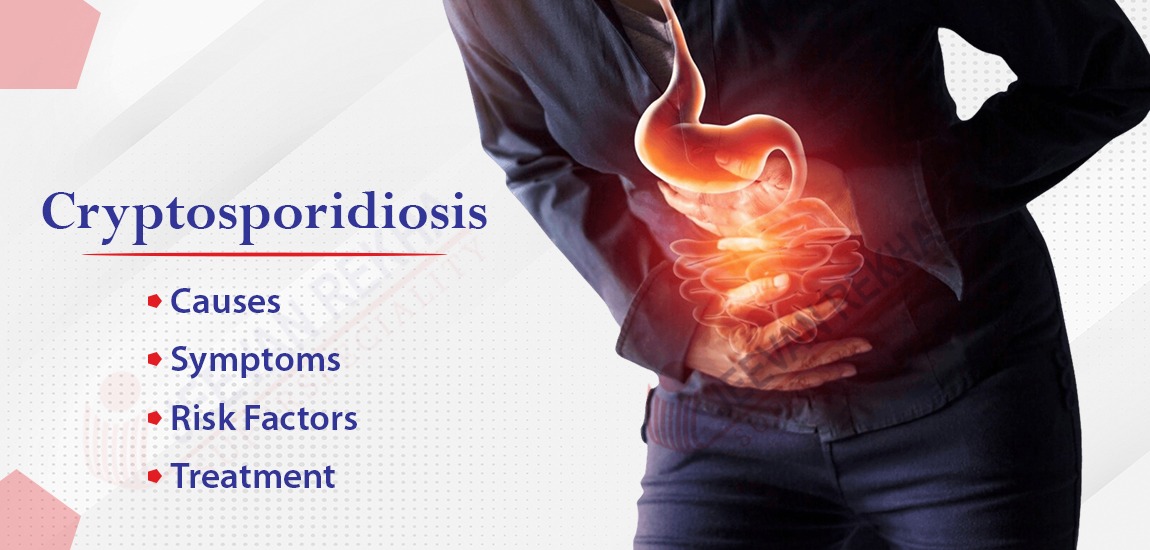
- By JRSH Admin
- In Health and Tips,
- Posted August 25, 2022
Tongue Problems: Symptoms, Causes, Diagnosis & Treatment
Overview
The tongue is a muscle-based organ that extends back into the pharynx and rests against the floor of the mouth. It extends back beyond what is visible inside the mouth and is joined to the jaw, the hyoid bone in the neck, and the skull.
Humans and many other animals utilise the tongue as an organ to aid in the chewing and swallowing of food. Your ability to talk also depends on how your tongue moves with your palate and teeth.
Wet mucosa makes up the tongue's outer layer. The microscopic papillae that give the tongue its rough texture are located in the top portion of the tongue. Taste buds that allow you to taste food are located in these papillae.
The 2,000–8,000 taste buds on a human tongue can be divided into three categories. Cells in these taste buds are activated when they encounter various flavors. Taste buds have a variety of shapes and locations on the tongue depending on their function.
Common Tongue Problems and their Symptoms
Thrush. Thrush, a form of yeast infection, causes bumpy, white patches to appear on the tongue.
Some warning signs and symptoms include:
- Tonsils, gums, and the roof of the mouth may suffer from creamy white lesions.
- cottage cheese-like blemishes that are somewhat elevated.
- Eating or swallowing may be hindered by intense redness, burning, or pain.
- a tiny amount of bleeding if the lesions are scraped or touched.
- Redness and cracking around the mouth's corners.
Burning mouth syndrome. It is uncertain what causes burning mouth syndrome, which causes the tongue and other parts of the mouth to feel hot to the touch. It could be brought on by hormonal shifts, nutritional deficits, allergic reactions, or nerve injury.
Burning mouth syndrome symptoms could include:
- Most frequently affecting your tongue, but also perhaps your lips, gums, palate, throat, or the entire mouth is a scorching or searing sensation.
- a feeling of tongue dryness coupled with increased thirst.
- Your mouth's taste may alter, becoming metallic or unpleasant.
- loss of flavor.
- Numbness, tingling, or stinging in your mouth.
Black hairy tongue. The majority of the time, a black, hairy tongue is more of a cosmetic issue than a health one. Because they don't shed their dead tongue cells, people with the syndrome accumulate dead tongue cells on top of their tongue. After a while, it starts to look like the tongue is covered in dark hair. This problem may arise following an antibiotic course or as a result of a diet heavy in soft foods that don't exfoliate the tongue's surface.
Despite the tongue's ability to be brown, tan, green, yellow, or white, there is black discoloration on it.
Black Hairy tongue symptoms
- a tongue that has a hairy or fuzzy appearance.
- altered flavor or metallic aftertaste.
- poor breath (halitosis).
- If the papillae are too overgrown, you may gag or feel tickled.
Oral Cancer. On the tongue, certain kinds of oral cancer can develop. The presence of a spot on the tongue, pain, and difficulty moving the tongue or jaw are all signs of tongue cancer.
Mouth cancer symptoms and signs might include:
- A persistent sore on the lips or mouth
- a spot inside of your mouth that is either white or red
- Missing teeth
- interior of your mouth, a growth or bump
- Mouth ache
- An earache
- difficulty swallowing or discomfort
Glossitis. The swelling of the tongue is known as glossitis.
Glossitis is frequently a sign of various disorders, including:
- Allergies to meals, medicines, or dental care products
- Sjögren syndrome-related dry mouth
- bacterium, yeast, or viral infection (including oral herpes)
- The injury can occur due to burns, rough teeth, or ill-fitting dentures.
- problems of the skin that impact the mouth
- irritants include alcohol, smoke, spicy foods, hot foods, and other irritants
- hormonal influences
- certain vitamin deficiency
Geographic tongue. Geographic tongue is a benign condition that results in inflammation that gives the tongue a map-like appearance. Although the disease can last for weeks, the majority of cases are painless and don't need to be treated. It might occasionally be a symptom of another tongue issue, such as thrush. Other times, it operates independently of all other circumstances.
The following are examples of geographic tongue symptoms and signs:
- Lesion-like, smooth, red, asymmetrical growths on the top or side of your tongue
- Changes in lesions' position, size, and shape on a regular basis
- When eating spicy or acidic foods, some people feel uncomfortable, painful, or burned.
Read also: What is Nanoplastia Hair Treatment
Causes of Tongue Problems:
Various factors can contribute to common tongue symptoms. Most tongue issues can be swiftly fixed and are generally not serious.
A sore or discolored tongue, however, may occasionally be a sign of more serious illnesses, such as vitamin deficiency, AIDS, or oral cancer. This makes it crucial to seek medical guidance if you experience any persistent tongue issues.
Causes of sore tongue or tongue bumps:
Your tongue may get irritated or develop unpleasant lumps for a variety of reasons, such as:
- Trauma. You may experience tongue pain while the wound is healing if you accidentally bite your tongue or scorch it on anything hot. The sides of the tongue can become painfully irritated by grinding or clenching your teeth.
- Smoking. Your tongue can become uncomfortable and irritated if you smoke too much.
- Cutaneous sores. These mouth ulcers on the tongue will affect a lot of people eventually. Although there is no recognized cause, they may get worse during times of increased stress.
- tongue burning syndrome. This symptom, which causes the tongue to feel scorched, can occur in certain postmenopausal women.
- increased papillae. Your tongue may develop a painful lump if one or more of your taste buds swell up due to irritation or inflammation.
- further medical issues. The symptom of various medical disorders, such as diabetes and anaemia, might be a sore tongue.
- mouth cancer Even while the majority of sore tongues aren't anything to be concerned about, you should see a doctor if the sore or lump doesn't go away in a week or two. Don't assume that because there is no pain that there is no problem because many oral malignancies are painless in the early stages.
Causes of white tongue:
A whitish coating or white spots can appear on the tongue for a variety of reasons, such as:
- Leukoplakia. The oral cells in this syndrome develop abundantly. White patches then start to develop inside the mouth, particularly on the tongue. Leukoplakia can be a sign of cancer even if it isn't always harmful on its own. Therefore, the origin of any white patches on your tongue must be found by your dentist. Leukoplakia is a condition that commonly affects smokers and can arise from irritation of the tongue.
- dental thrush Oral thrush. often called candidiasis, is a yeast infection that appears in the mouth. On the surfaces of the mouth and tongue, the condition causes white patches that frequently have the consistency of cottage cheese. Infants, the elderly, especially those who wear dentures, and those with compromised immune systems are the groups most likely to experience oral thrush. Thrush can also affect diabetics and persons using inhaled steroids to treat their asthma or lung conditions. Following the use of antibiotics, which may kill the "good" bacteria in the mouth, oral thrush is more likely to occur. Consuming plain yogurt with live, active cultures may aid in re-establishing the right oral flora. The infection may also be treated with medicines.
- Oral lichen planus. This illness may manifest as a network of lacy-appearing elevated white lines on your tongue. Although its etiology is frequently unknown to doctors, it typically gets well on its own. Practice good oral hygiene, abstain from cigarette use, and limit your intake of foods that irritate your mouth as some actions you may take that might be helpful.
Causes of black hairy tongue:
A black, hairy tongue may be unsettling to look at, but it usually means nothing significant. It results from an accumulation of germs, dead cells, and other material on your tongue that becomes trapped. There are several factors that can cause it, such as:
- excessive papillae. For your lifetime, the papillae, or little bumps on the surface of your tongue, expand. Instead of being worn down by daily activity, the papillae in some persons grow overly lengthy. They are more prone to have bacteria because of this. When these bacteria multiply, they can take on a dark or even black appearance, and the expanded papillae resemble hair.
- medical procedures. Antibiotic users or those through chemotherapy may be more prone to have a tongue covered in black hair.
- bad dental hygiene. The likelihood of developing this uncommon illness increases with poor tooth hygiene.
Causes of Geographic Tongue:
- Psoriasis: The inflammatory skin disorder psoriasis is prevalent in people with geographic tongues.
- Hormonal surges: It's possible that the female hormones in birth control pills are to blame for women who use oral contraceptives (birth control pills) developing geographic tongues.
- Vitamin deficiencies: People with a geographic tongue are more likely to be deficient in the vitamins B6, B12, folic acid, zinc, and iron.
- Fissured tongue: the fissured tongue is a condition that develops deep grooves or wrinkles on the tongue. Doctors believe that geographic tongue and fissured tongue may share a genetic relationship.
- Diabetes: According to certain medical professionals, type 1 diabetics are more likely to have a geographic tongue.
- Allergens: Eczema, hay fever, and other allergies may raise a person's risk of developing the disorder.
- Geographic tongue and heightened emotional stress have been linked by doctors.
Risk factors of Tongue problems:
- mouth breathing or sleeping with one's mouth open causes dry mouth.
- not properly flossing or cleaning your teeth
- disregarding tongue cleansing
- Dehydration
- irritation from teeth, braces, or dentures with sharp edges within the mouth
- frequent intake of alcohol
- using tobacco for dipping, chewing, or smoking
How are tongue problems diagnosed?
Your doctor will carefully inspect your tongue during your session. They will inspect the tongue's surface as well as the tongue as a whole to determine how it works.
A number of questions regarding your tongue and your symptoms will also be asked by your doctor. They will inquire as to
- how long have you experienced the symptoms?
- Whether or if your taste has altered
- what type of pain do you experience?
- if you have trouble moving your tongue
- If you have any additional oral health difficulties
- If you've ever used alcohol or tobacco, mention it.
Tongue tests
If the examination and your questions' responses don't allow your doctor to diagnose you, they may prescribe some tests.
With a complete blood count (CBC) test, your doctor will likely want to assess your general health and rule out any possible illnesses. A biopsy of the tongue may be requested if they suspect you have a serious condition, such as tongue cancer (Jeebh Ka Cancer).
You could require an indirect pharyngoscopy and laryngoscopy in some circumstances, which is a technique when a doctor looks at the base of your tongue using a small mirror mounted on long, thin handles. A flexible, fiberoptic endoscope will be used more frequently for the surgery.
The doctor might refer you for an imaging test if they believe you have a venolymphatic abnormality on your tongue. To confirm a diagnosis of an underlying condition, genetic testing may be necessary.
Your doctor will suggest therapies for your problem after making a diagnosis.
Read also: Brown Spot on Your Eye
Treatment for tongue problems:
Treatment for oral thrush
Your doctor might suggest one or more of the following medicines treats oral thrush:
- The oral antifungal drug fluconazole (Diflucan)
- the lozenge form of the antifungal drug clotrimazole (Mycelex Troche).
- nystatin (Nystop, Nyota), a mouthwash with antifungal properties that you can use on yourself or your child.
Treatment for Burning mouth syndrome
Stopping the burning sensation requires treating the underlying medical condition if your doctor determines that it is what is causing your BMS. A few of these are:
- Acid reflux: Treatment for BMS symptoms may include medication to reduce stomach acid.
- Ask your doctor about saliva-producing items if you have dry mouth, or take vitamin injections or supplements if you have a vitamin shortage.
- Mouth infection: Your doctor may also advise you to take painkillers or other medications to treat an underlying mouth infection.
Treatment for Black hairy tongue
- Oral hygiene: The first thing you should do if you have a dark, hairy tongue is taken measures to improve your oral hygiene. Make sure to thoroughly clean your tongue with a toothbrush or tongue scraper after brushing and flossing your teeth.
- Medication: Antibiotics, antifungal medicines, mouthwash, or retinoids can be used to treat a black, hairy tongue if oral hygiene has not improved (drugs related to vitamin A).
Treatment of Glossitis
- Drugs that are antibacterial, antifungal, or antiviral may aid in the recovery from a bacterial, fungal, or viral infection.
- For patients with glossitis brought on by a nutritional deficiency, a doctor may advise nutritional supplements. A person's diet may be supplemented with more of the deficient nutrient, per the doctor's advice.
Treatment of Geographic Tongue
- medicine on prescription. A doctor may recommend a corticosteroid rinse to assist in lessening inflammation. A little anaesthetic mouthwash may also help alleviate discomfort and irritation.
- Skip problematic foods. If possible, stay away from meals that make you irritable. Hot or spicy foods, acidic foods, salty foods, and sweet foods often cause rashes or burning sensations.
Tags
Blog Search
Latest Posts
-
Ear Infections (Otitis Media): Top Triggers & How to Avoid Them?
April 11, 2025 -
Implantation Bleeding Vs Periods: Know the Difference
March 12, 2025 -
5 Tips for a Happy and Healthy Summer
February 27, 2025 -
Body Ache (Pain): Causes, Symptoms and Treatment Options
February 10, 2025 -
Fatigue and Exhaustion: Causes, Symptoms, and Treatment
January 08, 2025




